SPECIAL RELEASE
November 2024 Inflation Report of Oriental Mindoro (Base Year: 2018)

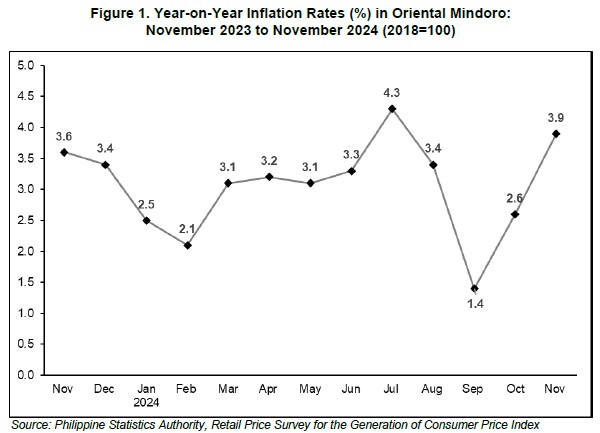
Headline Inflation
Oriental Mindoro’s headline inflation or the overall inflation increased to 3.9 percent in November 2024 from 2.6 percent in October 2024. This brings the provincial average inflation from January to November 2024 at 3.0 percent. In November 2023, inflation rate in the province was lower at 3.6 percent.
Main Drivers to the Upward Trend of the Headline Inflation
The uptrend in the overall inflation in November 2024 was primarily influenced by the faster annual increment in the heavily-weighted food and non-alcoholic beverages at 6.1 percent during the month from 3.0 percent in October 2024. Also contributing to the uptrend was transport with a slower year-on-year decrease of 1.6 percent from a 2.6 percent annual drop in the previous month.
Higher annual increments were also noted in the indices of the following commodity groups during the month:
a. Alcoholic beverages and tobacco, 2.9 percent from 2.2 percent;
b. Clothing and footwear, 1.6 percent from 1.5 percent;
c. Furnishings, household equipment and routine household maintenance, 0.7 percent from 0.4 percent;
d. Information and communication, 2.3 percent from 1.6 percent;
e. Recreation, sport and culture, 2.3 percent from 1.1 percent; and
f. Personal care, and miscellaneous goods and services, 2.0 percent from 1.9 percent.
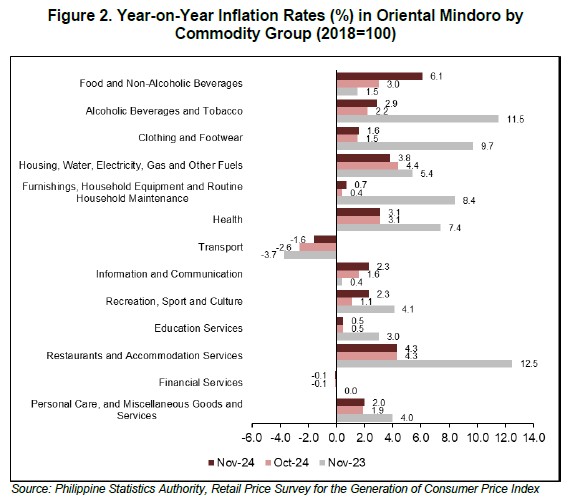
In contrast, housing, water, electricity, gas and other fuels registered a lower inflation rate of 3.8 percent during the month from 4.4 percent in October 2024.
The indices of the rest of the commodity groups retained their respective previous month’s inflation rates in November 2024. (Figure 2)
Main Contributors to the Headline Inflation
The top three commodity groups contributing to the November 2024 overall inflation of the province were the following:
• Food and non-alcoholic beverages with 69.3 percent share or 2.70 percentage points;
• Housing, water, electricity, gas and other fuels with 17.6 percentage share or 0.69 percentage point; and
• Restaurants and accommodation services, 6.30 percent share or 0.25 percentage point.
Food Inflation
Food inflation in Oriental Mindoro rose to 6.4 percent in November 2024 from 3.1 percent in the previous month. In November 2023, food inflation was lower at 1.5 percent.
Main Drivers to the Upward Trend of Food Inflation
The acceleration of food inflation in November 2024 was primarily brought about by the faster inflation rate of meat and other parts of slaughtered land animals at 22.5 percent in November 2024 from 10.9 percent in the previous month. This was followed by rice with an annual increase of 3.8 percent during the month from 2.7 percent in October 2024.
Moreover, higher annual growth rates during the month were observed in the indices of the following food groups:
a. Corn, 4.1 percent from -5.1 percent;
b. Flour, bread and other bakery products, pasta products and other cereals, 2.4 percent from 2.0 percent; and
c. Vegetables, tubers, plantains, cooking bananas and pulses, 6.5 percent from -4.1 percent;
In addition, slower annual decline was noted in the index of sugar, confectionery and desserts at 3.5 percent in November 2024 from a 5.6 percent annual decrease in the previous month.
On the contrary, lower annual growth rates during the month were observed in the indices of the following food groups:
a. Fish and other seafood, -2.6 percent from -2.1 percent.
b. Milk, other dairy products and eggs, 1.3 percent from 1.4 percent;
c. Oils and fats, 0.6 percent from 2.5 percent;
d. Fruits and nuts, 14.5 percent from 16.3 percent; and
e. Ready-made food and other food products, n.e.c., 4.1 percent from 5.0 percent.
INFLATION RATE BY FOOD GROUP
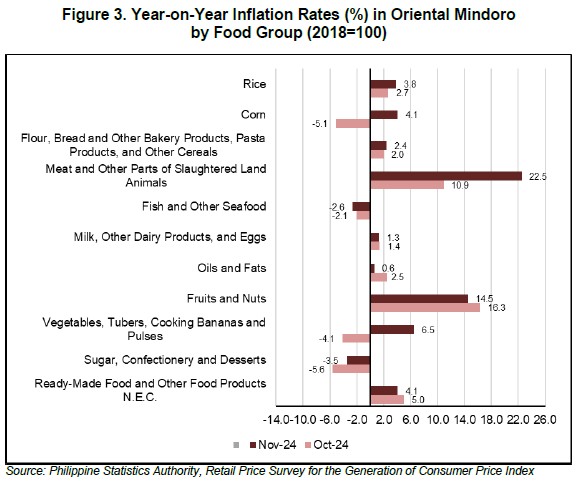
Purchasing Power of the Peso
The Purchasing Power of Peso (PPP) in Oriental Mindoro is at Php 0.73 in November 2024. The PPP was registered at Php 0.75 in November 2023.
As a result, the amount of goods that could be presently purchased by consumers was less than when the PPP was higher. Furthermore, the decrease in PPP was attributed to the higher inflation rate, given that PPP and inflation rate have an inverse relationship.
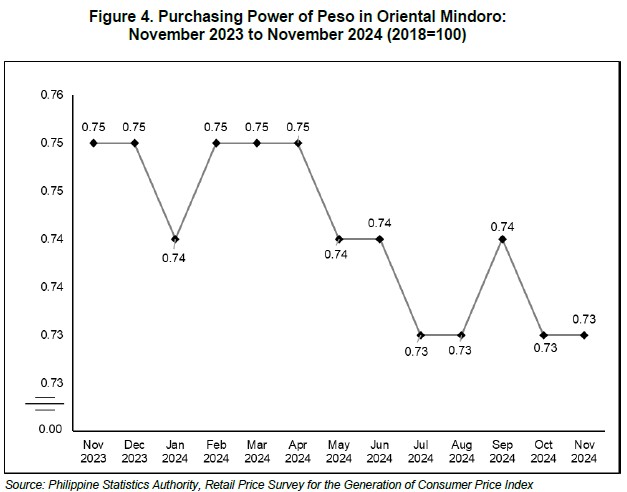
(SGD) CHARLYN ROMERO-CANTOS, PhD
(Chief Administrative Officer)
Officer-in-Charge
Oriental Mindoro Provincial Statistical Office
HTD/JGO
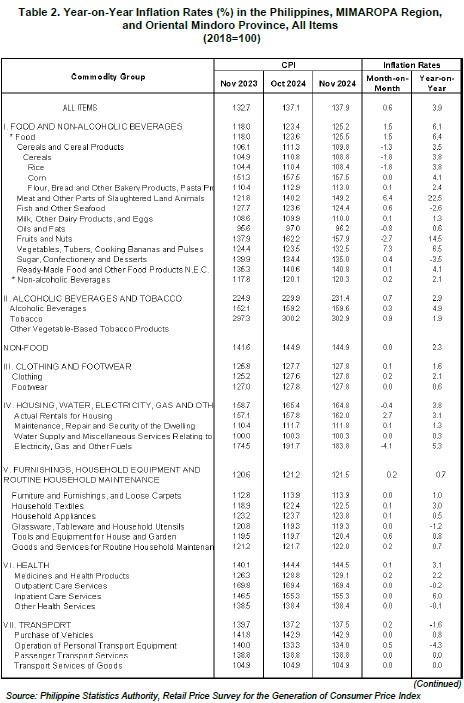
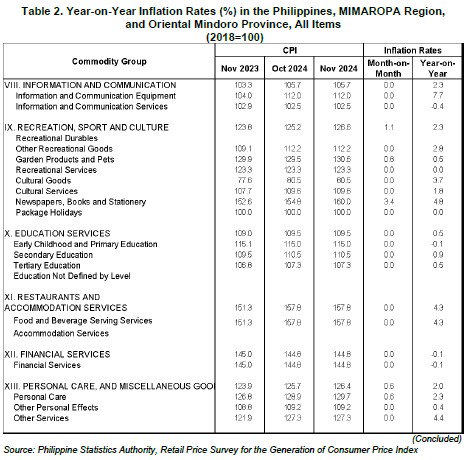
TECHNICAL NOTES
Consumer Price Index is an indicator of the change in the average prices of a fixed basket of goods and services commonly purchased by households relative to a base year.
• Market Basket is a sample of goods and services, which is meant to represent the totality of all the goods and services purchased by households relative to a base year.
To determine the commodities that will form the market basket for the 2018 based CPI, the Survey of Key Informants (SKI) was conducted in March 2021. The survey, which was conducted nationwide to store managers, sellers or proprietors, obtained information on the most commonly purchased of goods and availed of services by the households.
The commodities in the 2018-based CPI market basket are grouped/classified according to the 2020 Philippine Classification of Individual Consumption According to Purpose (PCOICOP) which is based on the United Nations COICOP. Meanwhile, the commodities in the 2012-based CPI market basket used the 2009 PCOICOP version of classification of commodities.
• Base year is a reference period, usually a year, at which the index number is set to 100. It is the reference point of the index number series. The CPI is rebased from base year 2012 to base year 2018.
• Inflation Rate is the annual rate of change or the year-on-year change in the Consumer Price Index (CPI).
• Purchasing Power of Peso is a measure of the real value of the peso in a given period relative to a chosen reference period. It is computed by getting the reciprocal of the CPI and multiplying the result by 100


